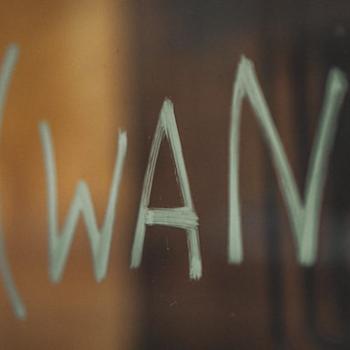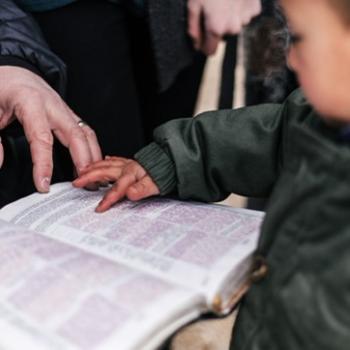There has been no shortage of commentary on the spread of the COVID-19 (Coronavirus) since it has taken hold of the public’s eyes. I find things like this fascinating because it truly reveals much about humanity. On the one hand, you have those who make light of the entire thing; they crack jokes as a means to cope, or they are completely nonplussed. On the other, there are some driven into varying degrees of anxiety and worry over what may come. For the one who isn’t in Christ, the only hope they truly have is in this fleeting and failing age. In that sense then, the panic is understandable; they have no hope of anything after death, or at best, they have a severely misplaced hope that will inevitably fall out from underneath them when their life is demanded of them. It is then that those who are not in Christ will see that there are worse things than death, and this in particular ought to cause any Christian to stop and think. Every man already carries a death sentence on his name; it is only a matter of what kills him and when.
Invariably though, I sense that if COVID-19 continues to expand globally, and if the media continues to pour non-stop coverage upon the flames of people’s anxieties—we will only continue to see more and more widespread panic. They will be consumed with thoughts of what they will eat, what they will drink, and what they will wear—for the very thought of these things being absent from their lives is a terrifying notion. Despite this, little attention is given to the weightier matters concerning the soul; yet my hope is that this is a time ripe for such contemplation. My earnest hope is that Christians will rise beyond their fears and anxieties of what a virus might do to them (or what it might not do to them) and serve a people that in many ways has spurned all they stand for.
For the Christian, this is an opportune time where you might learn from the example of those who have gone before us, such as when Martin and Katie Luther opened their home to treat victims of the plague when it came to Wittenberg. Or, perhaps one can learn from a modern example from the Christians in Wuhan who came to the aid of their fellow countrymen. My point here is not so much to say that we will reach a plague of sorts due to COVID-19, but simply that this is a time where we can actually show people there is something to hope for beyond this age. The worst that can happen to us is death—and that is no small thing, mind you, but even death holds no final authority for those in Christ. You actually have the means of hope to give people in a time like this and even times that are far worse, that is, if you actually believe that death holds no sway.
I have grown weary watching much of the talk among many professing Christians, largely because many of them, even some within a camp espousing the richness of an utterly sovereign God, are driven to anxiety over what may come. Christian, the sky is not falling—yet even if it were, are you truly so hopeless that you cannot see that God is the God of the living and not the dead? Are you not able to treasure the reality that to die is to be with Christ, in an infinitely greater state than you could ever possibly hope to be while on earth? Or is it that you have grown to be a lover of this age, perhaps not as heinously as the masses, but even just a little bit? At some point we must reconcile with these things and ask if we truly do believe the Words we claim to read and hear preached from the pulpit each week.
My earnest desire is that the church would be so purified that even in sever loss she could utter with Job, “Naked I came from my mother’s womb, and naked I shall return there. The LORD gave and the LORD has taken away. Blessed be the name of the LORD” (Job 1:21). To be clear: I am thinking of both the anxious and those who have no anxiety whatsoever at this time. I see in many ways a people afraid to the core of their being, not necessarily over COVID-19, but of anything that afflicts them or drives them into even a modicum of hardship. I continually see comments from many who would adamantly deny the prosperity gospel, yet believe it for themselves in the smallest of ways when their comfort is threatened. It may not come out in panic, but surely it manifests in other ways (i.e. a general fear of man). It is what causes me to wonder how many would actually endure if the road were to become all the harder to stand for Christ.
Perhaps I am just overly cynical, but I am not convinced we truly believe the hard words of Christ when we hear them or read them in our Bibles. We hear that we cannot love two masters—that we cannot serve both God and money (or fill in any other thing which competes with your love for Christ), and we still seek to figure out ways where we can find the exception to that rule. We hear that we ought not store up perishable treasures for ourselves on earth, but instead we ought to be storing up imperishable treasure in heaven—and yet many still seek to find a place on earth secure enough to store their wares. All the while we neglect to heed the fact that where our treasure is, there our hearts will also be. Why? We have convinced ourselves that our treasure on earth is not really what we treasure, even though it really is.
Much in the same way we hear the command of Christ that we do not worry as the Gentiles do about what we will eat, what we will drink, or what we shall wear—and yet so many will find every reason to say that disobedience to this command is not a sin. Likewise, the question is asked if we can add a single hour to our life by our worrying, and many know the answer, yet still give provision for the flesh. Yet interestingly enough, the cure to anxiety is in seeking Christ’s Kingdom and His righteousness—the last thing people want to hear when they admit their anxiety. In much the same vein do we find the apostle Paul give a successive list of commands the Christian is to put into practice, with the result being the peace and comfort of God (Phil. 4:4-9).
Do you want a little test to know if you are the anxious one or the one who has another master? Ask yourself: what is my reaction if tomorrow, all I have were to all disappear? What if I were to take the whole of it and give it to someone in greater need? What if it were stolen or lost? What if I lost all my dearest friendships simply by being faithful to Christ and His gospel? And if in your mind you sense none of these things would bother you in the slightest, then perhaps test yourself truly and see if you can part with some of it for a charitable cause, from which you stand to benefit no earthly reward. Preach the gospel to that family member you know will not respond in kindness. The rationalizations which come from such an exercise is what truly reveals what we treasure—no matter if you find yourself making a thousand excuses, or if you find yourself making just one. The heart is a fickle, fickle thing and deceptive above all else. Again, I ask, do we really believe this? We must come to grips with this fact or we will be tossed about by every wave that rocks the boat.
The point being drawn to is that as all things, freedom from anxiety and a fear of man, over the great things and the small, will not come if we neglect to put these things into practice. We shall not have a mind to combat the worry-chasing thoughts if we neglect to train ourselves to be transformed by the renewal of our minds. You shall never learn to cast all of your cares upon Him if you never first come to turn to Him in the midst of your worry. You will never make a practice of true generosity if your heart now longs for the treasures of this age. Likewise, you will always value your reputation if you are interested, even a little, in the opinion of men. Just as you did not learn to walk without stumbling after a few steps and crawling along the furniture, so too will you stumble in your fears and anxieties as you seek to put them to rest. It is not perfection in these practices that we seek, for this is ultimately a fool’s errand.
Rather, it is the practice of coming to Christ quicker each time we are faced with a cause for anxiety or a desire for the things of this age; it is being given to a spirit of prayer when they come, and shortening the time in which we turn to Him when in need. Yet it is also being given to a spirit of proactive prayers, where we consider what our future selves might be in need of when each day’s trouble arises. Surely, this is no silver-bullet approach to terminate all the things which happen to us which we do not like, but rather, it is a means of relying on Christ in the midst of such things. It is, in essence, recognizing that God is pleased to lend us strength in the midst of our frailty rather than remove some burdens. The idea is that prayer is communion with God, and communion with God is sweet even if the answers to our prayers are not as we expect. Communion with God is sweeter than the removal of cancer, the stop of a deadly disease, the difficulties of financial burdens, and even of pleasurable meals in good company. In that, we may find that death and hardship swallow us up; but if we must perish, let us perish in communion with Christ.
The crux of the matter is that indeed, there are much worse things than death—yet thanks be to God that He has already absolved us of the consequences to our sins and freed us from such things. We have no need to fear death nor the consequences of sin, and for that matter, we have no true need to fear anything on this earth. For what shall such worry bring, but much anxiety; and what shall such anxiety bring, but much folly; and what shall such folly bring, but much sin? Train your mind to bring the gospel to light in every instance and I promise you, it will become a balm to your soul and an ease to your heart in times of trouble. The same grace which saved you shall come to comfort you if you would simply avail yourselves to Christ and seek His kindness.
Show the world what this comfort looks like; they have no clue in the world what peace the gospel brings. Be that peace to them. Give them the hope of the gospel—no one else in all the world can give them such genuine hope that surpasses even death. There is no other hope which allows for man to say, “to die is gain.” We of all people know there are things far worse than death; be anxious for the souls of your neighbors rather than the state of the stock market, the spread of COVID-19, or anything else that may come your way while the Lord has yet granted you breath this day. Take much comfort in the fact that, “The steps of a man are established by the LORD, and He delights in his way. When he falls, he will not be hurled headlong, because the LORD is the One who holds his hand” (Ps. 37:23-24). Friend, until that fateful day the Lord calls us home, we have every reason to be bold for the sake of making known the richness of His love. We cannot die until the very nanosecond of our God-ordained, final breath is drawn.













